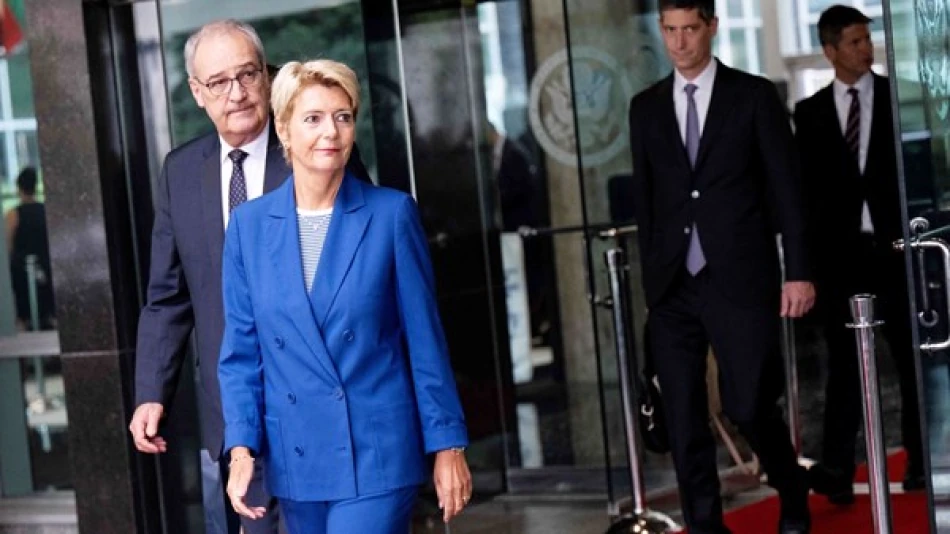
Switzerland and US Diplomats Discuss Tariff Negotiations
Switzerland Faces Trump's Harshest Tariff Threat as Leaders Rush to Washington for Emergency Talks
Swiss President Karin Keller-Sutter made an unscheduled diplomatic dash to Washington this week, scrambling to prevent some of the steepest tariffs in Trump's new trade offensive from devastating Switzerland's export economy. The Alpine nation faces a punishing 39% tariff rate starting Thursday—among the highest in Trump's sweeping tariff package targeting dozens of global economies.
Switzerland Singled Out in Trump's Trade War 2.0
The 39% tariff rate imposed on Swiss exports represents a dramatic escalation that places Switzerland in Trump's crosshairs more aggressively than major economic powers. By comparison, the European Union, Japan, and South Korea face tariffs of around 15%—less than half of Switzerland's burden.
This disparity signals Trump's particular frustration with Switzerland, a country he has previously criticized for its trade practices. The president's comment that Swiss President Keller-Sutter "wasn't interested in listening" during recent discussions suggests personal animosity may be driving policy, a hallmark of Trump's transactional diplomatic style.
Pharmaceutical Sector in the Crosshairs
While the immediate tariffs exclude pharmaceuticals—Switzerland's crown jewel export sector—Trump has ominously hinted at separate drug import tariffs starting low but potentially escalating to 250%. This threat strikes at the heart of Switzerland's economic model, where pharmaceutical giants like Novartis and Roche generate massive export revenues.
Emergency Diplomacy Reveals Swiss Vulnerability
The unscheduled nature of Keller-Sutter and Economy Minister Guy Parmelin's Washington trip underscores Switzerland's limited leverage. Unlike EU nations that can coordinate responses or threaten retaliatory measures, Switzerland operates as a smaller, isolated player despite its economic sophistication.
The Swiss delegation's meetings with Secretary of State Marco Rubio—while being denied direct access to Trump—illustrates the challenging dynamics small nations face when confronting U.S. trade pressure. Switzerland's traditional neutrality and diplomatic finesse offer little protection against Trump's blunt economic nationalism.
Market Implications and Investor Concerns
For investors, Switzerland's tariff crisis represents a stress test for one of the world's most export-dependent developed economies. Swiss multinational corporations, from luxury goods makers to precision manufacturers, face immediate margin compression and potential supply chain disruptions.
The Swiss franc's safe-haven status may provide some currency cushion, but sustained trade tensions could undermine Switzerland's position as a stable hub for international business. Pharmaceutical stocks, in particular, face uncertainty as Trump's drug tariff threats loom over the sector's pricing power in the crucial U.S. market.
Broader Strategic Context
Switzerland's predicament reflects Trump's broader strategy of isolating individual countries rather than confronting multilateral blocs. By imposing disproportionately harsh terms on Switzerland while offering relatively lighter treatment to larger trading partners, Trump appears to be testing whether smaller economies will capitulate more quickly.
This approach mirrors tactics used against countries like Canada and Mexico in Trump's first term, where bilateral pressure eventually forced renegotiation of trade terms. Switzerland's challenge will be demonstrating sufficient economic value to warrant preferential treatment without appearing to cave to U.S. demands.
Most Viewed News

 Layla Al Mansoori
Layla Al Mansoori






